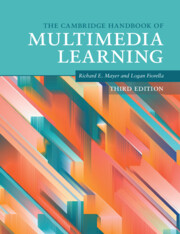Book contents
- The Cambridge Handbook of Multimedia Learning
- The Cambridge Handbook of Multimedia Learning
- Copyright page
- Contents
- Figures
- Tables
- Contributors
- Preface
- Acknowledgments
- Part I Background
- Part II Theoretical Foundations
- Part III Basic Principles of Multimedia Learning
- Part IV Principles for Reducing Extraneous Processing in Multimedia Learning
- Part V Principles for Managing Essential Processing in Multimedia Learning
- Part VI Principles Based on Social and Affective Features of Multimedia Learning
- Part VII Principles Based on Generative Activity in Multimedia Learning
- Part VIII Multimedia Learning with Media
- 37 Multimedia Learning with Cognitive Tutors
- 38 Multimedia Learning with Animated Pedagogical Agents
- 39 Multimedia Learning with Simulations
- 40 Multimedia Learning with Computer Games
- 41 Multimedia Learning with Instructional Video
- 42 Multimedia Learning in Virtual and Mixed Reality
- 43 Multimedia Learning with Visual Displays
- 44 Multimedia Learning from Multiple Documents
- 45 Multimedia Learning in e-Courses
- 46 Principles for Educational Assessment with Multimedia
- Author Index
- Subject Index
- References
40 - Multimedia Learning with Computer Games
from Part VIII - Multimedia Learning with Media
Published online by Cambridge University Press: 19 November 2021
- The Cambridge Handbook of Multimedia Learning
- The Cambridge Handbook of Multimedia Learning
- Copyright page
- Contents
- Figures
- Tables
- Contributors
- Preface
- Acknowledgments
- Part I Background
- Part II Theoretical Foundations
- Part III Basic Principles of Multimedia Learning
- Part IV Principles for Reducing Extraneous Processing in Multimedia Learning
- Part V Principles for Managing Essential Processing in Multimedia Learning
- Part VI Principles Based on Social and Affective Features of Multimedia Learning
- Part VII Principles Based on Generative Activity in Multimedia Learning
- Part VIII Multimedia Learning with Media
- 37 Multimedia Learning with Cognitive Tutors
- 38 Multimedia Learning with Animated Pedagogical Agents
- 39 Multimedia Learning with Simulations
- 40 Multimedia Learning with Computer Games
- 41 Multimedia Learning with Instructional Video
- 42 Multimedia Learning in Virtual and Mixed Reality
- 43 Multimedia Learning with Visual Displays
- 44 Multimedia Learning from Multiple Documents
- 45 Multimedia Learning in e-Courses
- 46 Principles for Educational Assessment with Multimedia
- Author Index
- Subject Index
- References
Summary
Computer games for learning use multimedia elements such as animation and spoken or printed text to foster learning of academic skills or knowledge. Research on game-based learning can be categorized into three research genres: value added research, cognitive consequences research, and media comparison research. Value added research seeks to determine which game features promote learning. Cognitive consequences research seeks to determine whether students learn anything useful playing an off-the-shelf game. Media comparison research seeks to determine whether students learn better from computer games than from conventional media. Future research is needed that adds replication studies to the research base, determines moderating and mediating factors, examines how to implement games in learning contexts and how to balance motivational and cognitive features in games, and provides practical recommendations.
Keywords
- Type
- Chapter
- Information
- The Cambridge Handbook of Multimedia Learning , pp. 472 - 486Publisher: Cambridge University PressPrint publication year: 2021
References
- 1
- Cited by



